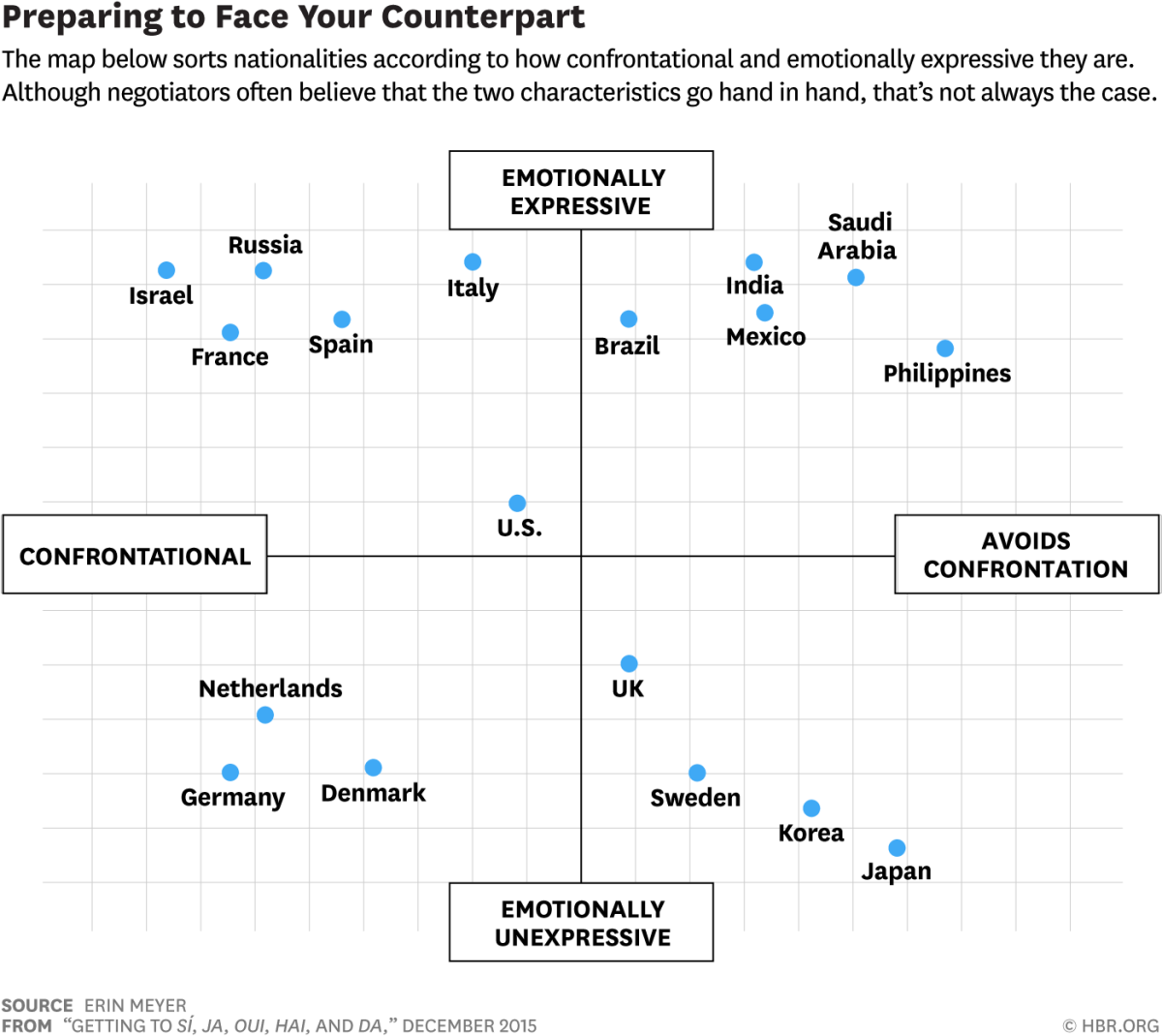It can be difficult enough to negotiate within your own home culture, but it can become even more trying when cultural differences are factored in. You have probably noticed cultural differences when communicating and collaborating with international labs. Language barriers aside, the way messages are received can vary widely and are often viewed through a cultural lens.
Erin Meyer, Professor at INSEAD, and the author of The Culture Map: Breaking Through Invisible Boundaries of Global Business has been studying this topic for years. You can watch an interesting video on international communication styles at Harvard Business Review entitled “Getting to Yes Across Cultures”.
 She also created a spectrum and sorted nationalities based on how confrontational and emotionally expressive they are. For example, the U.S. is considered mildly emotionally expressive and confrontational. In America, it is quite common to say, “I totally disagree.” This could seem like a banal statement; however, in other cultures, this same sentence could provoke anger and a breakdown within the relationship and the negotiation. It might be better to be less blunt and say things like, “I don’t quite understand your point. Can you explain more?”
Some cultures, like Denmark, Germany, and the Netherlands, view open disagreement as a positive as long as it is expressed calmly. Whereas in cultures like Japan and Korea, any disagreement could be seen as a failure. So, the next time you are heading into a big meeting or negotiation, take a moment to remember how your own cultural lens might affect your perceptions all the while recognizing how this might be the same or different for your counterpart.
She also created a spectrum and sorted nationalities based on how confrontational and emotionally expressive they are. For example, the U.S. is considered mildly emotionally expressive and confrontational. In America, it is quite common to say, “I totally disagree.” This could seem like a banal statement; however, in other cultures, this same sentence could provoke anger and a breakdown within the relationship and the negotiation. It might be better to be less blunt and say things like, “I don’t quite understand your point. Can you explain more?”
Some cultures, like Denmark, Germany, and the Netherlands, view open disagreement as a positive as long as it is expressed calmly. Whereas in cultures like Japan and Korea, any disagreement could be seen as a failure. So, the next time you are heading into a big meeting or negotiation, take a moment to remember how your own cultural lens might affect your perceptions all the while recognizing how this might be the same or different for your counterpart.
 She also created a spectrum and sorted nationalities based on how confrontational and emotionally expressive they are. For example, the U.S. is considered mildly emotionally expressive and confrontational. In America, it is quite common to say, “I totally disagree.” This could seem like a banal statement; however, in other cultures, this same sentence could provoke anger and a breakdown within the relationship and the negotiation. It might be better to be less blunt and say things like, “I don’t quite understand your point. Can you explain more?”
Some cultures, like Denmark, Germany, and the Netherlands, view open disagreement as a positive as long as it is expressed calmly. Whereas in cultures like Japan and Korea, any disagreement could be seen as a failure. So, the next time you are heading into a big meeting or negotiation, take a moment to remember how your own cultural lens might affect your perceptions all the while recognizing how this might be the same or different for your counterpart.
She also created a spectrum and sorted nationalities based on how confrontational and emotionally expressive they are. For example, the U.S. is considered mildly emotionally expressive and confrontational. In America, it is quite common to say, “I totally disagree.” This could seem like a banal statement; however, in other cultures, this same sentence could provoke anger and a breakdown within the relationship and the negotiation. It might be better to be less blunt and say things like, “I don’t quite understand your point. Can you explain more?”
Some cultures, like Denmark, Germany, and the Netherlands, view open disagreement as a positive as long as it is expressed calmly. Whereas in cultures like Japan and Korea, any disagreement could be seen as a failure. So, the next time you are heading into a big meeting or negotiation, take a moment to remember how your own cultural lens might affect your perceptions all the while recognizing how this might be the same or different for your counterpart.



